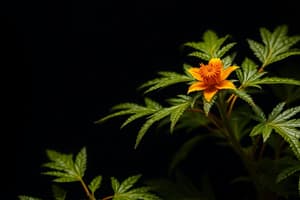Podcast
Questions and Answers
What is a medicinal herb composed of?
What is a medicinal herb composed of?
- Tender parts of plant axis, leaves, flowers, and fruits (correct)
- Dry leaves and herbs only
- Only roots and stems of plants
- Seeds and fruits exclusively
Which of the following is a characteristic of the herb Lobelia?
Which of the following is a characteristic of the herb Lobelia?
- Contains alkaloids (correct)
- Grows in aquatic environments
- Only used for cosmetic purposes
- Contains volatile oil
Which herb is known to contain volatile oil?
Which herb is known to contain volatile oil?
- Vinca
- Cannabis
- Ergot
- Mentha (correct)
What part of the plant is used from Mentha piperita for medicinal purposes?
What part of the plant is used from Mentha piperita for medicinal purposes?
What is the taste characteristic of thyme?
What is the taste characteristic of thyme?
Which of the following active constituents is found in thymol?
Which of the following active constituents is found in thymol?
What type of stomata is characteristic of Mentha?
What type of stomata is characteristic of Mentha?
Which medicinal use is unique to thyme compared to mentha?
Which medicinal use is unique to thyme compared to mentha?
Which of the following is NOT a component of the volatile oil from Mentha?
Which of the following is NOT a component of the volatile oil from Mentha?
Identify the type of hair found in both mentha and thyme.
Identify the type of hair found in both mentha and thyme.
What unique function does mentha serve that is not listed for thyme?
What unique function does mentha serve that is not listed for thyme?
Which component is considered a flavonoid in both plants?
Which component is considered a flavonoid in both plants?
Which of the following is true about non-glandular hairs in mentha?
Which of the following is true about non-glandular hairs in mentha?
Which of the following is NOT an external use of decongestants?
Which of the following is NOT an external use of decongestants?
What color indicates a positive test for Mentha when using H2SO4 and vanillin?
What color indicates a positive test for Mentha when using H2SO4 and vanillin?
Which contraindication is specific to Mentha?
Which contraindication is specific to Mentha?
Which of the following is a special chemical test related to Thyme?
Which of the following is a special chemical test related to Thyme?
What condition may result from high doses of Thymol?
What condition may result from high doses of Thymol?
Which of the following is a contraindication for using Thyme?
Which of the following is a contraindication for using Thyme?
Which is true regarding the use of pure menthol?
Which is true regarding the use of pure menthol?
What substance developed a deep bluish green color when tested with Thymol and HNO3?
What substance developed a deep bluish green color when tested with Thymol and HNO3?
Flashcards are hidden until you start studying
Study Notes
Medicinal Herbs
- A drug derived from the tender parts of plants, including leaves, flowers, and fruits.
- Types of medicinal herbs include:
- Parts of aerial shoots (e.g., Cannabis).
- Whole aerial parts (e.g., Lobelia).
- Complete plants, including roots.
- Undifferentiated plant bodies, such as Thallophyta (e.g., Ergot and fucus).
Herbs of Medicinal Importance
- Groups based on active constituents:
- Herbs containing alkaloids (e.g., Vinca, Cannabis).
- Herbs containing volatile oils (e.g., Mentha, Thyme).
- Herbs containing resin (e.g., Ergot, Ephedra).
Key Examples of Medicinal Herbs
-
Mentha
- Family: Labiatae (Lamiaceae).
- Aroma: Characteristic and aromatic.
- Taste: Aromatic with a cold sensation.
- Active constituents:
- Volatile oil (Menthol, Menthone, Menthyl Acetate).
- Tannins, flavonoids.
-
Thyme
- Family: Labiatae (Lamiaceae).
- Aroma: Aromatic and pungent.
- Active constituents:
- Volatile oil (Thymol, Carvacrol).
- Tannins, flavonoids, gums, resins.
Microscopical Characteristics
-
Mentha Powder
- Diacytic stomata.
- Glandular hairs (Labiaceous and Capitate) and non-glandular hair (multicellular).
-
Thyme Powder
- Non-glandular bent hair.
Medicinal Uses
-
Mentha
- Gastrointestinal tract benefits: Carminative, digestive, anti-spasmodic, antimicrobial, anti-emetic, and promotes liver/gall bladder function.
- Respiratory benefits: Decongestant.
- External uses: Local anaesthetic, anti-pruritic, anti-parasitic.
-
Thyme
- Gastrointestinal tract benefits: Carminative, digestive, anti-spasmodic, antimicrobial, and anthelmintic.
- Respiratory benefits: Used for whooping cough, as an expectorant, secretolytic, and disinfectant for inhalations.
Chemical Tests
-
Mentha
- Positive micro-chemical tests with Sudan III.
- Special test results: Menthol crystals react with H2SO4 and produce color changes.
-
Thyme
- Special test results: Thymol crystals react with glacial acetic acid and other chemicals to yield notable colors.
Contraindications & Drug Interactions
-
Mentha
- Contraindications: Not advisable for GERD, infants, gallstones; can be poisonous in pure form; avoid on irritated skin.
-
Thyme
- Contraindications: High doses of thymol can lead to liver toxicity; concentrated forms are contraindicated in pregnancy.
- Drug interactions: Can interfere with anticoagulants, increasing bleeding risk.
Studying That Suits You
Use AI to generate personalized quizzes and flashcards to suit your learning preferences.





